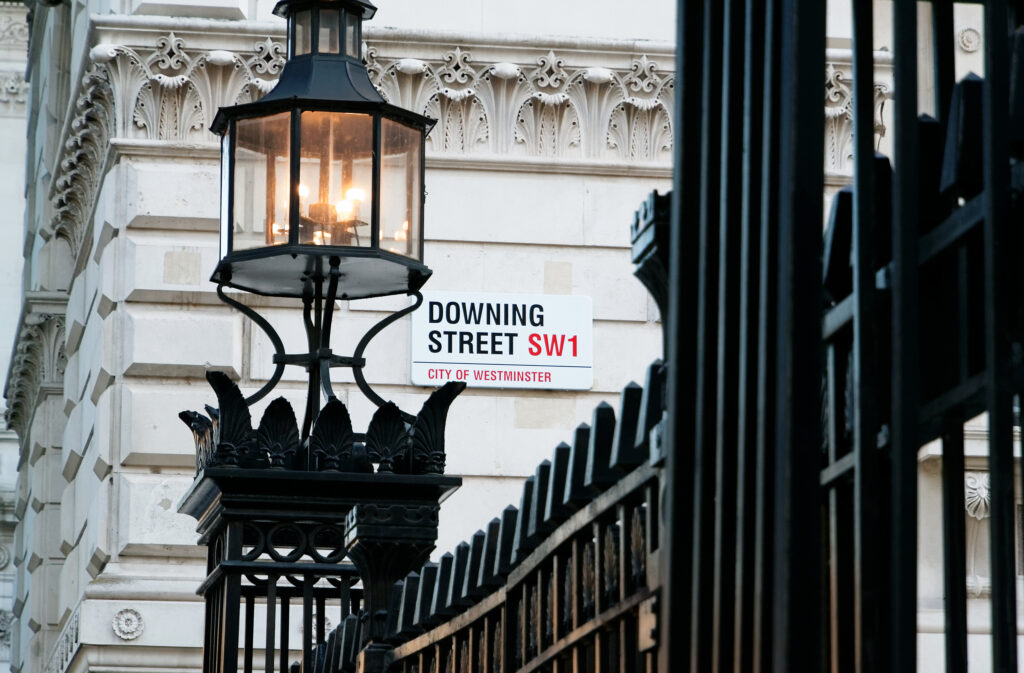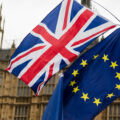Religion and Boris Johnson’s last days
Religion and Boris Johnson’s last days
Religion featured in important and surprising ways in the lead-up to Boris Johnson announcing his resignation, as Frazer MacDiarmid explores.
This weekly comment was written by Frazer MacDiarmid and reflects his personal analyses and opinions, rather than those of EARS.
‘Muddled’ is a good word to describe Former UK Prime Minister Boris Johnson’s relationship to religion. His personal faith has veered from the Catholicism of his mother, through the Anglicanism of his school, back to his latest wife’s Catholicism.[1] He hit the headlines in 2018 after saying Muslim women wearing the burka “look like letter boxes,”[2] and recently broke with ministerial etiquette to allegedly criticise the archbishop of Canterbury.[3]
As the dust settles from Johnson’s resignation speech on 7 July, we begin to see how religion played a role in his demise. A religious perspective on his leadership is important in understanding what Johnson did wrong, and what the next prime minister must do differently.
Mid-April – Johnson criticises archbishop of Canterbury
It is an unspoken rule that sitting ministers should never complain about the head of the Church of England.
But in an address to his Conservative Party colleagues, Johnson allegedly faulted Archbishop Justin Welby for being less critical about Russia’s invasion of Ukraine than he was of the UK’s Rwanda deportation scheme. Despite the Church of England calling this a “disgraceful slur,” Johnson refused to apologise, with some announcing an ‘open battle’ between Downing St and Lambeth Palace.[4]
Backed by Johnson and Home Secretary Priti Patel, the Rwanda deportation scheme would see the UK flying unauthorised migrants to the African country to resolve the UK’s problems with people traffickers and asylum seekers. The scheme was widely criticised as unethical by faith leaders and politicians alike.[5] [6] [7]
16 June – Johnson’s ethics adviser resigns
In a clear sign of things to come, Johnson’s ethics adviser resigned after making comments relating to Johnson’s ‘partygate’ scandal. Lord Geidt said there was a “legitimate question” about whether the PM broke ministerial rules in his involvement with illegal gatherings of high-ranking officials at his Downing St residence during the first COVID-19 lockdown.[8]
Being accountable for the ethics of any politician, let alone one as infamous as Johnson, must be a tough job. Indeed, Geidt’s predecessor in the job quit after Johnson overruled him about a bullying scandal relating to a Cabinet official.[9]
26 June – Johnson weighs in on transgender debate
In a bizarre twist, Johnson waded into the controversial subject of trans rights. He said that he thinks women cannot be born with a penis, and that there is a difference between trans women and biological women. The PM’s comments were reported among conservative social and religious media agencies, who tend to support similar beliefs.[10] [11] [12] [13] Johnson’s comments have implications for the ability of trans women to compete in sporting events, and on their recognition in society more generally.
Johnson made the comments while travelling to Rwanda to further the deportation scheme mentioned above, and would have further alienated liberal faith communities. The PM himself would have welcomed the chance to distract from the chaos unfolding in his Conservative Party.[14]
6 July – Faith Minister resigns
Britain’s Faith Minister, Kemi Badenoch, was among five MPs who resigned in protest at Boris Johnson’s mishandling of the Chris Pincher scandal. In her resignation letter, Badenoch called for the PM to step down “for the good of the party and the country.”[15]
The catalyst for a wave of ministerial resignations, the Pincher scandal broke when Johnson admitted knowing about allegations of sexual harassment against Mr Pincher before appointing him as his party’s Deputy Chief Whip. Johnson was also reluctant to pursue disciplinary action against him.[16] [17]
The Faith Minister “works with religious and community leaders to promote faith, religious tolerance and stronger communities.”[18] Given the mounting scandals of Johnson’s government, it is little wonder that the minister responsible for faith communities could not retain both her job and a clean conscience.
7 July – Johnson announces resignation
Johnson’s resignation speech was widely criticised for lacking any admission of fault or regret at the numerous scandals that have plagued his time in office. He ascribed his resignation largely to chance and the mysterious “herd instinct” of his ministerial colleagues.[19]
Aftermath
Religious voices have been prominent in commentary about Johnson’s resignation. The Catholic Bishop of Portsmouth stated publicly that Johnson “lack[ed] a clear moral compass” and that “sleaze and prevarication … completely undermined his authority.”[20] Other bishops from both Anglican and Catholic denominations agreed, pointing out the need for Johnson’s successor to place morality, integrity, and truth at the forefront of their leadership.[21]
It is clear that the cronyism that so came to characterise Johnson’s premiership cannot form part of the next government. The leader must be seen to serve the cause of equality, never placing personal advantage above that of the country. They must show courage in the pursuit of truth and recognise their mistakes when they occur.
One of the triumphs of Johnson’s final few months was his strong support of Ukraine against invading Russian forces. Rarely is there a global event which is perceived so clearly as a case of good versus evil, and Johnson certainly made the most of backing the causes of freedom, justice, and human rights.[22] His successor would do well to continue this aspect of Johnson’s legacy.
Whereas former US President Donald Trump enjoyed (unfailing) support from some religious elements, religious supporters of Johnson were few and far between. Religion is still a strong motivator in British society, and clerics are still widely perceived as arbiters of morality.
Perhaps religious credibility should be a higher priority for the next PM than it was for Johnson.
This weekly comment was written by Frazer MacDiarmid and reflects his personal analyses and opinions, rather than those of EARS.
Our team of analysts conducts daily research on religion and society. In the past month, the topics of tension and leadership were trending. Find out their relationships on the EARS Dashboard.
[1] A Catholic prime minister in No 10 is a watershed moment
[2] Boris Johnson faces criticism over burka ‘letter box’ jibe
[3] Boris Johnson criticism of archbishop of Canterbury ‘a disgraceful slur’
[4] No 10 goes into battle with archbishops over Rwanda asylum plan
[5] Government plans to deport asylum-seekers to Rwanda denounced by faith leaders
[6] No 10 goes into battle with archbishops over Rwanda asylum plan
[7] Boris Johnson criticism of archbishop of Canterbury ‘a disgraceful slur’
[8] Lord Geidt quits as Boris Johnson’s ethics adviser
[9] Boris Johnson adviser quits after being overruled on Priti Patel bullying report
[10] Christian Today: Only men can be born with a penis, says Boris Johnson
[11] The Daily Mail: Boris Johnson says there is a difference between being a woman and a trans women and that some ‘cannot be born with a penis without being a man’
[12] The Telegraph: Boris Johnson: Women cannot be born with a penis
[13] The Christ Gospel Radio: Only men can be born with a penis, says Boris Johnson
[14] The Daily Mail: Boris Johnson says there is a difference between being a woman and a trans women and that some ‘cannot be born with a penis without being a man’
[15] Religion news 7 July 2022
[16] The Pincher scandal is only the latest in a long line of controversies for Johnson
[17] Boris Johnson was made aware of formal Chris Pincher complaint
[18] Minister of State for Faith and Communities
[19] Boris Johnson’s resignation speech: what he said, and what he meant
[20] Lack of “a clear moral compass” led to prime minister’s downfall, says Catholic Bishop of Portsmouth
[21] The next prime minister ‘needs a clear moral compass’
[22] Boris Johnson’s resignation speech: what he said, and what he meant






